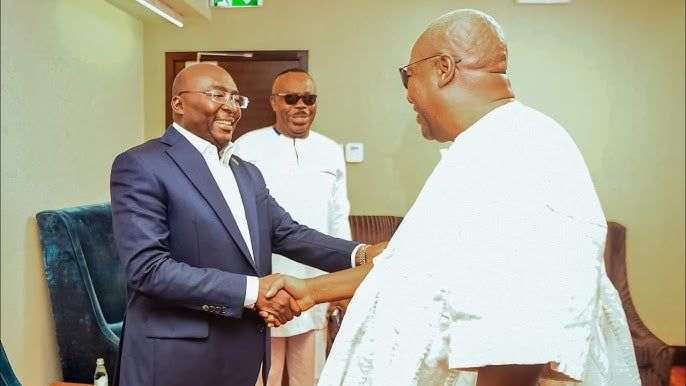The political landscape of Ghana is abuzz with anticipation as the New Patriotic Party (NPP) gears up for its presidential primaries scheduled for January 31, 2026. The spotlight shines brightly on former Vice President Dr. Mahamudu Bawumia, who, despite his defeat in the 2024 general elections, has declared his unwavering intent to contest the NPP flagbearership and subsequently reclaim the presidency in 2028. Bawumia’s loss to incumbent President John Dramani Mahama of the National Democratic Congress (NDC) by a significant margin of 1.7 million votes hasn’t dampened his spirit, but rather, has fueled his determination, drawing inspiration from Mahama’s own political resurgence after his 2016 defeat. Addressing a supportive audience of former Metropolitan, Municipal, and District Chief Executives (MMDCEs), Bawumia invoked Mahama’s comeback as a testament to the possibility of his own political revival. This declaration sets the stage for what promises to be a fiercely contested internal race within the NPP.
Bawumia’s declaration has ignited a wave of activity within the NPP, with various factions and individuals aligning themselves with potential candidates. While Bawumia emerges as a prominent figure, the field of contenders is expanding, featuring a diverse array of political personalities. Names being circulated within party circles include Kennedy Agyapong, the outspoken former MP for Assin Central; Dr. Yaw Osei Adutwum, former Minister of Education; Bryan Acheampong, the MP for Abetifi; Kwabena Agyei Agyepong, a former General Secretary of the NPP; and, of course, Bawumia himself. Each potential candidate brings a unique set of strengths and experiences to the table, promising a dynamic and engaging contest for the party’s nomination.
The early stages of the campaign are already witnessing a flurry of endorsements and declarations of support. Bawumia appears to be gaining significant traction, having reportedly secured the backing of over 60 current members of the NPP’s Minority Caucus in Parliament and more than 200 former MMDCEs. These endorsements signify a strong base of support within the party’s existing structures, potentially giving Bawumia an early advantage in the race. However, the race is still in its nascent stages, and the landscape can shift dramatically as other candidates solidify their campaigns and garner support from various factions within the party.
Bawumia’s campaign strategy appears to be centered on the narrative of his experience as Vice President, his deep understanding of the intricacies of government, and his vision for Ghana’s future. He is likely to emphasize his role in the previous NPP administration’s economic policies and development initiatives. He may also seek to position himself as a unifying figure within the party, capable of bridging divides and bringing together different factions to present a united front against the NDC in the 2028 general elections. The challenge for Bawumia will be to effectively articulate how he intends to overcome the shortcomings that led to the NPP’s defeat in 2024 and convince party members that he is the best candidate to lead them back to victory.
The other potential candidates will undoubtedly present their own compelling narratives and platforms. Kennedy Agyapong, known for his outspokenness and populist appeal, may resonate with a segment of the party base seeking a more radical departure from the established political order. Dr. Yaw Osei Adutwum’s background in education could appeal to those prioritizing human capital development and educational reform. Bryan Acheampong and Kwabena Agyei Agyepong, each with their own distinct political trajectories and perspectives, will likely carve out their niches within the broader field of contenders. The ensuing competition of ideas and visions will ultimately benefit the NPP by forcing a thorough examination of the party’s strengths and weaknesses, and ultimately shaping its platform for the 2028 elections.
The NPP presidential primaries are not simply an internal party affair; they hold significant implications for the future of Ghana. The chosen candidate will not only represent the NPP in the 2028 presidential election but will also shape the party’s policy direction and overall political strategy. The contest will be a closely watched event, providing insights into the evolving political dynamics within Ghana and the potential direction of the country’s future. The outcome of these primaries will undoubtedly shape the political landscape for years to come, influencing the national discourse and determining the course of Ghana’s trajectory.


